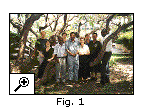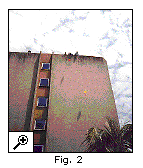|
|
 |
|
| |
In May to July 1998, in response to a recommendation made by the Second Regional Steering Committee meeting, Rachel Roland and Monique Trudel, Consultants from the University of Wolverhaptom and EduCom respectively, undertook a Training Needs Analysis for the Project and constructed a Training Strategy, designed to:
 The LTBP Training Strategy is based on hundreds of hours of interviews with national scientists, technicians, resource managers, policy makers and other stakeholders at both the lakeside stations and the capitals of the four riparian nations. The interviews were designed to survey perceptions of national and institutional training and human-capacity needs. Roland and Trudel developed a comprehensive strategy for addressing these needs in both the medium and long term. The LTBP Training Strategy is based on hundreds of hours of interviews with national scientists, technicians, resource managers, policy makers and other stakeholders at both the lakeside stations and the capitals of the four riparian nations. The interviews were designed to survey perceptions of national and institutional training and human-capacity needs. Roland and Trudel developed a comprehensive strategy for addressing these needs in both the medium and long term.
 The implementation of the Strategy started by the recruitment of Training Education and Communication Coordinators (TECC) in each riparian country. A first workshop with the TECCs was carried out in January 1999 to: "establish a programme of environmental education and training for Lake Tanganyika and its basin". The result of this first meeting of Francophone and Anglophone participants was a recognition of their expertise as individuals and as a team (Fig. 1, 2). Terms of reference and roles were clarified in regards to LTBP priorities.
The implementation of the Strategy started by the recruitment of Training Education and Communication Coordinators (TECC) in each riparian country. A first workshop with the TECCs was carried out in January 1999 to: "establish a programme of environmental education and training for Lake Tanganyika and its basin". The result of this first meeting of Francophone and Anglophone participants was a recognition of their expertise as individuals and as a team (Fig. 1, 2). Terms of reference and roles were clarified in regards to LTBP priorities.
Though the LTBP Training Strategy analyzes training needs throughout all domains of the project, because the TECCs are at the same time the LTBP Environmental Education Coordinators, many of the training activities relate to Environmental Education.
|
|